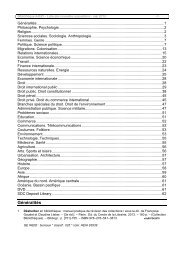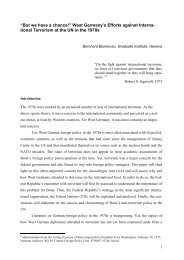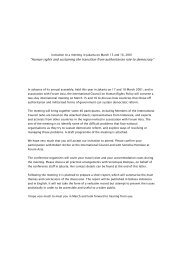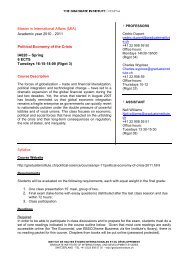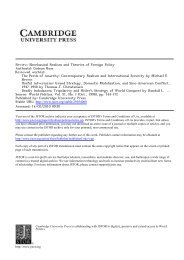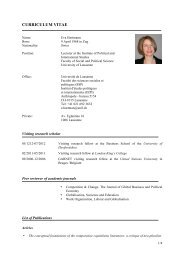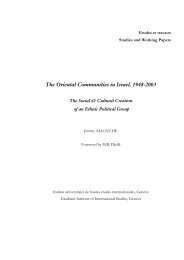Extending International Criminal Law beyond the Individual to ...
Extending International Criminal Law beyond the Individual to ...
Extending International Criminal Law beyond the Individual to ...
Create successful ePaper yourself
Turn your PDF publications into a flip-book with our unique Google optimized e-Paper software.
<strong>Extending</strong> <strong>International</strong> <strong>Criminal</strong> <strong>Law</strong> 905<br />
United States Federal Courts has focused attention on <strong>the</strong> scope of complicity<br />
in this context. The ATS confers upon <strong>the</strong> federal district courts original<br />
jurisdiction over ‘any civil action by an alien for a <strong>to</strong>rt only, committed<br />
in violation of <strong>the</strong> law of nations’ (28 U.S.C. section 1350). But <strong>the</strong>se cases<br />
are riddled with complexity. In order <strong>to</strong> show that <strong>the</strong> corporation has committed<br />
a violation of international law, it may be necessary <strong>to</strong> show that<br />
<strong>the</strong>re was a degree of state action or that <strong>the</strong> corporation acted under<br />
‘colour of law’. As soon as <strong>the</strong> plaintiffs can show this, <strong>the</strong> defendants start <strong>to</strong><br />
argue that <strong>the</strong> courts should refuse <strong>to</strong> hear <strong>the</strong> case because <strong>the</strong>re is <strong>to</strong>o much<br />
state action. Two separate arguments are emerging. The first concerns a ‘combatant<br />
activities exception’. According <strong>to</strong> a recent ruling:<br />
The policy underlying <strong>the</strong> FTCA’s [Federal Tort Claims Act] combatant activities exception is<br />
that <strong>the</strong> military ought be ‘free from <strong>the</strong> hindrance of a possible damage suit’ based on its<br />
conduct of battlefield activities. Johnson, 170 F.2d at 769. In this respect, <strong>the</strong> policy echoes<br />
<strong>the</strong> Supreme Court’s admonition that ‘[i]t would be difficult <strong>to</strong> devise a more effective<br />
fettering of a field commander than <strong>to</strong> allow <strong>the</strong> very enemies he is ordered <strong>to</strong> reduce <strong>to</strong><br />
submission <strong>to</strong> call him <strong>to</strong> account in his own civil courts and divert his efforts and attention<br />
from <strong>the</strong> military offensive abroad <strong>to</strong> <strong>the</strong> legal defensive at home.’ Johnson v. Eisentrager, 339<br />
U.S. 763, 778 (1950). 20<br />
As <strong>the</strong> claim is argued as a <strong>to</strong>rt under <strong>the</strong> law of nations, claimants may need<br />
<strong>to</strong> show state action or ‘official complicity’ in order <strong>to</strong> show that <strong>the</strong> acts were<br />
violations of <strong>the</strong> law of nations. A second jurisdictional argument now appears.<br />
At this point, jurisdictional blockers pop-up again in a ra<strong>the</strong>r paradoxical form.<br />
The greater <strong>the</strong> official complicity, <strong>the</strong> harder will it be <strong>to</strong> avoid claims that <strong>the</strong><br />
case has <strong>to</strong> be dismissed on political grounds. In <strong>the</strong> words of Judge Robertson<br />
in <strong>the</strong> same case concerning Abu Ghraib: ‘And <strong>the</strong> more plaintiffs assert official<br />
complicity in <strong>the</strong> acts of which <strong>the</strong>y complain, <strong>the</strong> closer <strong>the</strong>y sail <strong>to</strong> <strong>the</strong><br />
jurisdictional limitation of <strong>the</strong> political question doctrine.’ 21<br />
Let us, however, leave <strong>to</strong> one side <strong>the</strong> jurisdictional rules and concentrate on<br />
some recent rulings concerning <strong>the</strong> scope of complicity in violations of international<br />
criminal law in general, and in particular complicity in war crimes,<br />
crimes against humanity and genocide.<br />
It is perfectly possible <strong>to</strong> bring a suit against a corporation for violating<br />
international law as <strong>the</strong> principal perpetra<strong>to</strong>r, and suits have indeed been<br />
brought, for example, with regard <strong>to</strong> allegations of violations of international<br />
law, including <strong>to</strong>rture and inhuman or degrading treatment, committed by<br />
contrac<strong>to</strong>rs providing interpretation and interrogation services <strong>to</strong> <strong>the</strong> United<br />
States at Abu Ghraib prison in Iraq. 22 More recently a case has been filed also<br />
20 Order of 6 November 2007, Ibrahim et al. v. Titan et al. andSalehetal.v.Titanetal., US District<br />
Court for <strong>the</strong> District of Columbia, James Robertson US District Judge, Case 1: 05-cv-01165-JR,<br />
at 7.<br />
21 Order of 26 June 2006, Saleh et al. v. Titan Corp,436F.Supp.2d55,at5.<br />
22 For <strong>the</strong> background, see <strong>the</strong> Order of 6 November 2007, Ibrahim et al. v. Titan et al. andSaleh<br />
et al. v. Titan et al., supra note 21.



![Download [pdf] - The Graduate Institute, Geneva](https://img.yumpu.com/23370020/1/190x248/download-pdf-the-graduate-institute-geneva.jpg?quality=85)
